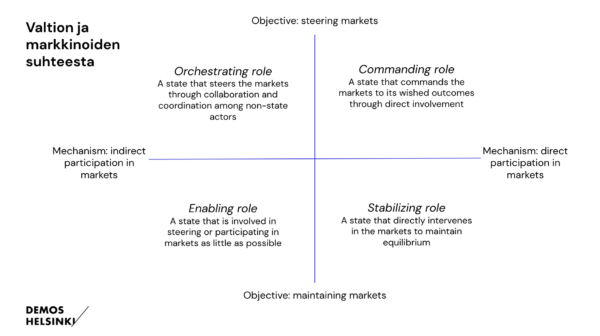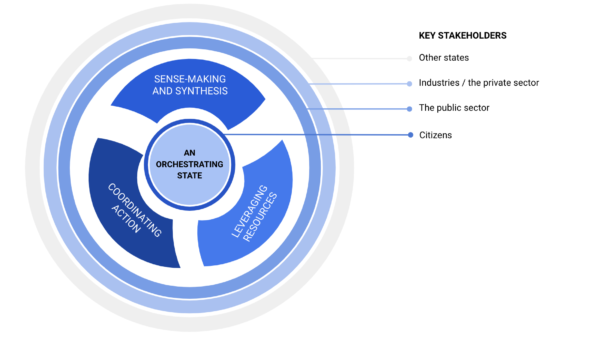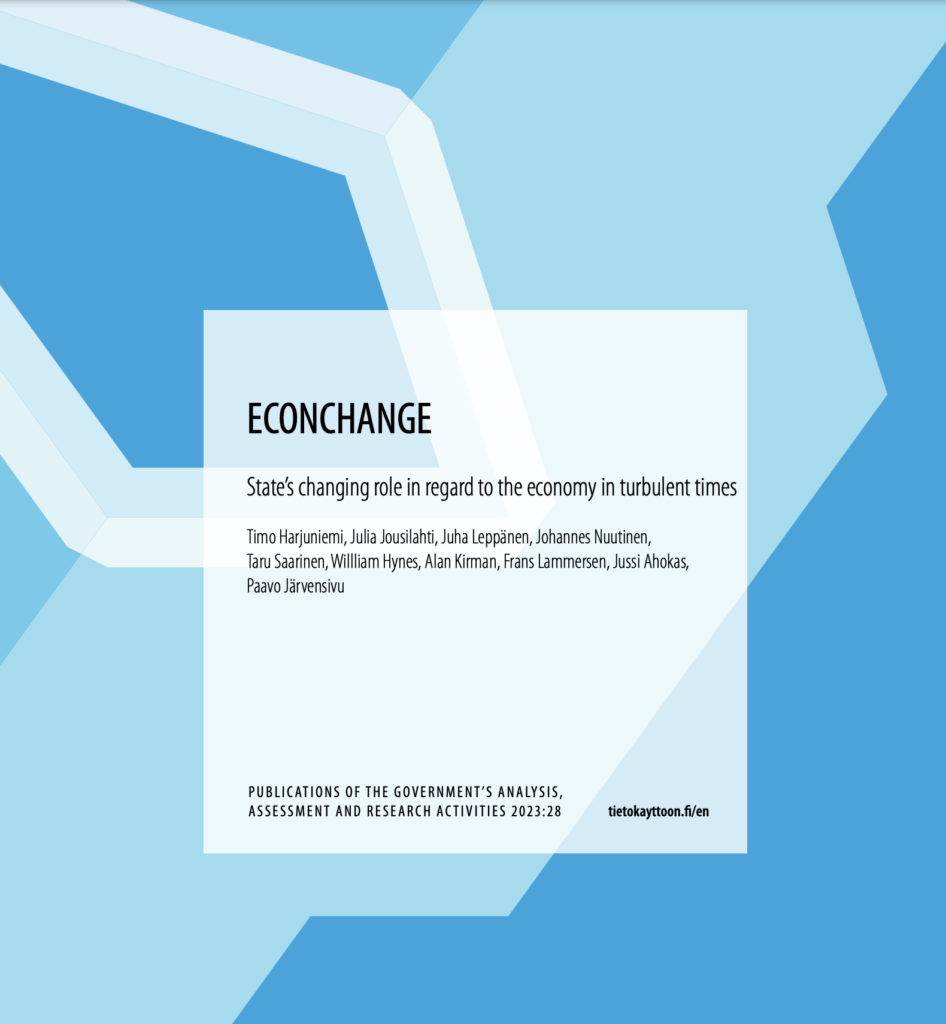In this publication, we suggest that the premises of our economies are in flux, requiring the state to take on a new role in governing the economy: the role of the orchestrator. An orchestrating state conducts its economic policy by closely working with its key stakeholders to achieve explicitly and democratically defined goals.
Pressure on economic systems challenges the established premises of fiscal, trade, labor, industrial and innovation policies in Finland and calls for the state to take a more active role in the economy. What role will that be? What capabilities and capacities need to be developed?
In this publication, co-authored by Demos Helsinki, OECD NAEC, and BIOS Research Institute, we suggest that the premises of our economies are in flux, requiring the state to take on a new role in governing the economy: the role of the orchestrator. In general, governing economic policy in the 21st century requires new capabilities. The state must maintain an up-to-date understanding of the complex and constantly changing operational environment, steer societal resources towards implementing democratically decided strategic goals, and more strongly coordinate different actors and sectors of society towards these goals. Strengthening these capabilities requires adequate public administration resources and civil servants’ training.
An orchestrating state conducts its economic policy by closely working with its key stakeholders to achieve explicitly and democratically defined goals.
Here is a summary of the analysis and key suggestions:
1 The role of the state in Finland when economic premises are changing
Two analytical axes can define the state’s involvement in the economy (see Figure 1):
(1) the overall objective of the state in the economy: whether it aims at altering the dynamics of the market or at maintaining and balancing the markets and their functioning;
(2) the preferred level of participation within markets.

The four roles can exist and, in most cases, are present simultaneously: it is possible for some state agencies to be acting primarily as enablers of markets when other actions can aim at stabilizing other markets. In the past decades, the Finnish state has emphasized an enabling and stabilizing role. However, the Finnish economy faces the same pressures as the rest of the world. The Covid-19 pandemic and Russia’s invasion of Ukraine and its aftermath have required states’ active involvement to ensure the sustainability of their economies and societies. In addition to short-term shocks, the economy is facing a number of long-term challenges: the need to tackle climate change and rapidly transition to a fossil-free energy system, the strengthening of geopolitical blocs and tensions, an aging population, and the effects of technological development on employment.
In this changing context, the publication calls for the Finnish state to experiment with its role and move beyond its objective to maintain markets. Our analysis focuses on four key economic policy domains and their respective challenges in the current operational environment, namely:
– Fiscal and monetary policy: Can balanced budgets continue to be a primary goal when tackling unexpected geopolitical and other crises? How should Finland react to possible stronger fiscal integration at the EU level?
– Trade policy: Can Finland continue to tap into a globalized trade market when this becomes unstable?
– Labour policy: What kind of new coordination mechanisms could be developed between the labor market organizations and the state to steer the society in turbulent times?
– Industrial and innovation policy: Can Finland ensure that the EU’s approach to industrial policy will also benefit smaller member states?
To address the above questions, we suggest that the Finnish state needs to take the role of the orchestrator. While the notion of an orchestrating state implies a more active steering role for the state, it also tries to capture the nuance needed to fit the context of where societies are today. No state can (or should) steer the economy alone. To illustrate, no state knows how to ramp up green hydrogen industries successfully. Yet, leaving this only to the markets allows a risk of not identifying and resolving fundamental bottlenecks (e.g., gaps in infrastructure) early enough.
Orchestration relies on democratic accountability through political ownership and heavy stakeholder involvement.
In Finland, emphasizing the state’s orchestrating functions would be beneficial in light of the current global and local economic environment. First, compared to more traditional Finnish economic policy stances of an enabling or stabilizing state, an orchestrating state takes an active role in making sense of uncertainty and trying new types of policy responses to advance in fluctuating circumstances while ensuring that policy outcomes are ultimately accountable to the broader society.
Second, it prompts and supports the autonomous initiative of private stakeholders to allow for experimentation and innovation to flourish within and across markets. It also ensures that private initiative feeds into the solution of democratically chosen societal challenges. As a result, the orchestrating state aims to navigate the ‘decade of uncertainty’ by achieving a balance between equally relevant needs for top-down coordination and bottom-up experimentation.
As a result, such functions within the state also serve the purpose of creating alignment and agreement among key economic stakeholders. Orchestrating means that not all costs of transition investment need to be public, but the state can create incentives to attract other forms of financing that feed into the stated goals. Being able to steer action and resources beyond the state’s direct own agencies and institutions remains an evermore important function of coordination.
2 How can the Finnish state become an orchestrating state?
An orchestrating state conducts its economic policy by closely working with its key stakeholders to achieve explicitly and democratically defined goals. An orchestrating role within economic policy does not radically alter key economic policy mechanisms (e.g., regulation, taxation, subsidies and public goods). However, it can govern them in a more integrated approach by identifying strategic policy goals that can help the country navigate a highly uncertain environment and thus sustaining collective welfare.
What capabilities would unlock the state’s ability to orchestrate the Finnish economy towards strategic policy goals within an uncertain global environment? We propose three: sensemaking and synthesis, leveraging resources, and coordinating action.
2.1 Sensemaking and synthesis
A key component of smart contemporary economic orchestration is ensuring that actions are based on the best possible information available. Without thorough and continuous processes of sensemaking and synthesis, economic policy can be disengaged from global changes and developments.
The Finnish state already has multiple existing institutions and mechanisms devoted to sensemaking and synthesis among economic policy, and illustrative examples include:
– The Economic Council within the Prime Minister’s Office
– Strategic research instruments
– Governmental programs
2.2 Leveraging resources
An orchestrating state’s key capability is steering resources beyond its direct control. In Finland alone, the estimated investment needed to reach climate goals is 242 billion euros worth of private and public investments. Such a scale of investments is unlikely to be mobilized exclusively through public investments, but a hands-off approach of waiting for private investment to be attracted to green solutions has proven too slow.
There are existing practices and policy initiatives in place that can be credibly seen as leveraging resources towards economic transitions:
– The Finnish Climate Fund
– Electric vehicle subsidies
– Long-term R&D plan
2.3 Coordinating action
The overall objective of the orchestration of economic policy is to steer markets towards strategic (democratically defined) policy goals. First, stakeholder management is critical to ensure that the actors involved are both aligned and work in collaboration where needed. Second, coordinating action requires skills for advanced policy delivery.
There are well-functioning mechanisms for coordinating economic policy and its delivery
already in place in Finland:
– Regional councils
– Economic policy coordinator within the Ministry of Finance
– Industrial low-carbon roadmaps

Most importantly, orchestration relies on democratic accountability through political ownership and heavy stakeholder involvement. Ultimately, the risk of inaction is that Finland misses the opportunity unlocked by current global change pressures. The Finnish state as a whole needs to take accountability for orchestrating a Finnish economy fit for the future.
You can read the entire publication here.


The big “how”: New ways to govern industrial policy
Post
July 13, 2023